Negotiating peace with the Philippine MILF
- Published
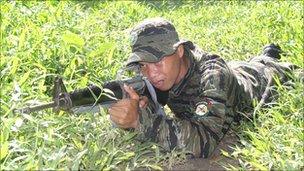
Those close to the talks know there is now a vital window of opportunity for a lasting peace deal
In a jungle in the southern Philippines, a training exercise is under way.
Men carrying AK47s and rocket-propelled grenades are marching in unison, following the instructions of a battle-hardened commander.
In their combat fatigues, they could easily be mistaken for government soldiers, except for a red badge on their left shoulder and the periodic cry of "Allahu Akbar!", the Arabic for "God is great!"
They are members of the Moro Islamic Liberation Front (MILF), a rebel group fighting for the rights of the Bangsamoro people - a Muslim community in a country that is more than 80% Catholic.
Moro rebels have been fighting against the government for nearly 40 years, in one of Asia's longest-running insurgencies. An estimated 120,000 people have been killed.
It is a conflict that has nearly been resolved several times, and a fragile ceasefire has been in place since 2003.
But despite repeated attempts from both sides, something always seems to prevent a lasting settlement.
In May, there was renewed hope that a solution might be reached. A popular new president, Benigno Aquino, had just been elected into office in Manila, and one of his main campaign pledges was to restart peace talks and bring an end to the violence.
But nearly six months on, nothing has happened, and the Bangsamoro people are angry.
We passed a rally near the city of Cotabato, with several thousand people waving placards and shouting: 'We want peace.'
"When there are no negotiations, there are hostilities - there is war," said Raby Angkal, one of the protest organisers.
Elusive deal
So what is the hold-up this time?
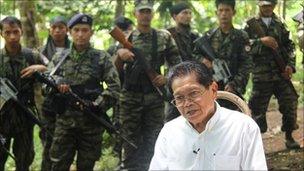
Ghadzali Jaafar says this is not a religious struggle but a fight to retain land and cultural identity
"I think the government should make the first move, not us," vice-chairman for political affairs, Ghadzali Jaafar, told us at his jungle camp.
In her office hundreds of miles away in Manila, the presidential adviser on the peace process, Teresita Deles, said the government was also ready - but there was just one problem.
"We have some concerns about Othman Abdul Razak," she said, confirming media speculation that the government had requested a new Malaysian facilitator for the talks, due to a belief that Mr Othman was not neutral.
On the surface, the inclusion or otherwise of one person in the talks process might seem like a relatively small obstacle - but as both sides know to their cost, if the details are not fully agreed by everyone, a deal could easily slip through their fingers.
In 1976, a peace agreement signed with another Islamic group, the MNLF, failed to stick, leading to the formation of the MILF.
In 1996 the government set up a semi-autonomous region, but that too failed to stop the fighting, because it did not address all the MILF's concerns or those of many local people.
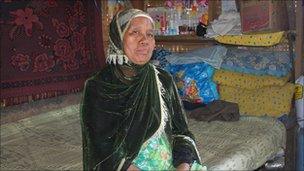
Hja Bidariya Kanakan and her family were caught up in the conflict in 2008
In August 2008, after 11 years of negotiations, the government said it had finally agreed on the boundaries for a Muslim autonomous region - a key sticking point - and smiling officials from all sides met to sign a deal.
But local Christian groups complained they had not been fully consulted, and the Supreme Court stepped in and blocked the agreement.
Within weeks conflict had resumed, and by the end of the year an estimated 300,000 civilians had fled their homes. Two years later, many of them have still not gone back.
Hja Bidariya Kanakan and her family live with two other families in a wooden hut in Nunangan camp, several hours' drive away from her former home.
"I used to have a big house with air conditioning," she said. "Now life is awful."
But she said she would only contemplate going back when there was "no more war, and no bombs from planes".
Heart of discussions
What makes this conflict all the more frustrating for people like Hja Biariya is that the negotiators are obviously close to a deal.
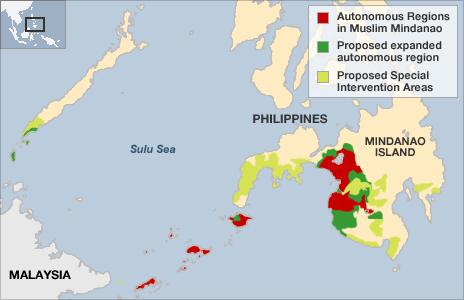
The MILF is often described as an Islamic separatist group, but strictly speaking neither of these adjectives apply any longer.
The group is Islamic in that it is run by Muslims, but according to Ghadzali Jaafar, this is not a religious struggle but a fight to retain land and cultural identity.
And the MILF has also given up its demand for a separate state.
"We just want to govern ourselves and our homeland, and that government will still be under the republic of the Philippines. We can take the example of Hong Kong to China," Mr Jaafar said.
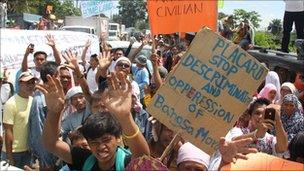
All sides also know that, the longer they delay the talks, the angrier people will get
The government also knows it needs to make some serious concessions.
"Certainly it could mean some adjustments in territorial boundaries," said Secretary Deles. "It would mean adjustments in our legal system, financial system."
Both agree that the issue of the Bangsamoro ancestral domain, and what exactly should be included in an expanded autonomous region, is at the heart of the discussions.
And those close to the talks know there is now a vital window of opportunity.
A key reason for past failures is opposition from other Filipinos - Christians living in the affected areas, and people in the rest of the country who will mourn the loss of such ready access to the rich natural resources of western Mindanao.
A quick look at the votes in this year's presidential election clearly shows the depth of feeling in Mindanao's Christian areas.
Joseph Estrada, a former leader who led a campaign of all-out war against the MILF, won the most votes in every Christian province in Mindanao, even though he lost nationally to Mr Aquino by a huge margin.
"A peace agreement will not be popular in many parts of the Philippines," said Father Jun Mercado, a regional peace advocate. "I believe we can only have an agreement when the national leader enjoys a lot of public support."
And right now, President Aquino has that kind of support - something his unpopular predecessor Gloria Arroyo could only dream about.
All sides also know that, the longer they delay the talks, the angrier people will get - and the more chance there is that the bubbling frustration will spill over into bloodshed.
When asked whether he thought there could be a return to violence if the talks did not start soon, Ghadzali Jafaar thought carefully before saying: "It's a very dangerous situation."
For those who could be caught - yet again - in the crossfire, it could be a very dangerous situation indeed.